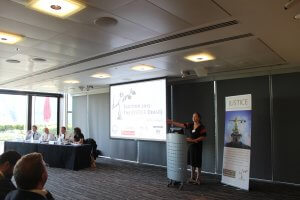As we prepare for a general election and a new Parliament, last week JUSTICE brought together representatives of the three main sitting parties in the last to discuss their record on the justice system and their manifesto commitments for 2015 and beyond. Lord Faulks QC (Conservative), Simon Hughes (Liberal Democrat) and Andy Slaughter (Labour) joined us for a lively discussion, chaired by Afua Hirsch, Social Affairs Editor, Sky News.
From legal aid, court fees, j udicial review and ‘secret evidence’ the work of this Parliament has had a significant impact on the complexion of our justice system and on our civil, criminal and administrative law. Commitments for 2015 are likely to range from new surveillance legislation and further counter-terror measures to new rights for victims and repeal of the Human Rights Act 1998. Against this background, this debate was a timely opportunity for the legal community to come together and discuss justice system priorities for the next Government. The evening was supported by The Bar Council, The Chartered Institute of Legal Executives and The Law Society; and by the Society of Conservative Lawyers, the Society of Labour Lawyers and the Liberal Democrat Lawyers Association.
udicial review and ‘secret evidence’ the work of this Parliament has had a significant impact on the complexion of our justice system and on our civil, criminal and administrative law. Commitments for 2015 are likely to range from new surveillance legislation and further counter-terror measures to new rights for victims and repeal of the Human Rights Act 1998. Against this background, this debate was a timely opportunity for the legal community to come together and discuss justice system priorities for the next Government. The evening was supported by The Bar Council, The Chartered Institute of Legal Executives and The Law Society; and by the Society of Conservative Lawyers, the Society of Labour Lawyers and the Liberal Democrat Lawyers Association.
The debate was in two parts; focusing first on commitments to justice, and second on protecting human rights in the UK. The discussion in both parts was enlightening and the atmosphere lively but civilised. The topics covered ranged from access to justice for victims of domestic violence and trafficking to the scope of a new regulatory framework for surveillance and the internet. However, at the heart of the discussion were key statements on the parties’ positions on legal aid and court costs, and on the Human Rights Act 1998 and our commitment to the European Convention on Human Rights. Key moments include:
- Repetition of a Labour Party commitment to repeal changes to judicial review in the Criminal Justice and Courts Act 2015, and to stop the introduction of “two-tier” criminal contracting. Andy Slaughter said, in his view, the change to legal aid in the Legal Aid Sentencing and Punishment of Offenders Act 2012 “wasn’t thought through or entirely careless as to what would happen”. (00:14). Both Lord Faulks and Simon Hughes MP stressed that the challenges the Ministry of Justice were facing had to be considered in the context of real budgetary limitations (00:18, 00:25). While all three parties made commitments to review in the new Parliament, any further consideration of investment would be subject to budgetary considerations.
- All three panellists made statements on their parties’ positions on the Human Rights Act 1998 and the European Court of Human Rights. Simon Hughes suggested any change in our relationship with the Convention was “cloud-cuckoo land”. He was open to a Bill of Rights which built on existing protections (01:17). Andy Slaughter emphasised Labour’s commitment to the Human Rights Act, but was pressed on what reforms Labour would seek to make at Strasbourg (01:08, 01:15). Lord Faulks argued that the Human Rights Act 1998 had not brought rights home, but “subcontracted” them to Strasbourg. Critical of the commitment in Article 46 ECHR which requires the UK to implement judgments of the European Court of Human Rights, he revisited the commitment made in October by the Conservative Party to consider withdrawal from the Convention, on six-months’ notice (from 01:00).
- All three panellists recognised that the next Parliament would see a renewed debate on the proper scope of surveillance powers in a digital age. Simon Hughes further committed the Liberal Democrat party to the introduction of a new “Digital Bill of Rights” (00:58).
It is not possible to cover the breadth of topics covered in the evening in this short article but you can watch the debate in full for yourself.
For live commentary from the event see #JUSTICEdebate15 on Twitter.
Read a write-up of the event by the thejusticegap
JUSTICE will launch its next report, Delivering Justice in an Age of Austerity on 23 April 2015.
For further information on JUSTICE’s position on the future of human rights protection in the UK, and our defence of the Human Rights Act 1998, see here.
This event was kindly hosted by Allen & Overy.
